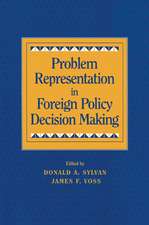Failed States and Institutional Decay: Understanding Instability and Poverty in the Developing World
Autor Natasha M. Ezrow, Erica Frantzen Limba Engleză Paperback – 11 sep 2013
| Toate formatele și edițiile | Preț | Express |
|---|---|---|
| Paperback (1) | 243.73 lei 6-8 săpt. | |
| Bloomsbury Publishing – 11 sep 2013 | 243.73 lei 6-8 săpt. | |
| Hardback (1) | 836.73 lei 6-8 săpt. | |
| Bloomsbury Publishing – 11 sep 2013 | 836.73 lei 6-8 săpt. |
Preț: 243.73 lei
Preț vechi: 292.37 lei
-17% Nou
Puncte Express: 366
Preț estimativ în valută:
46.64€ • 48.82$ • 38.59£
46.64€ • 48.82$ • 38.59£
Carte tipărită la comandă
Livrare economică 08-22 aprilie
Preluare comenzi: 021 569.72.76
Specificații
ISBN-13: 9781441150516
ISBN-10: 144115051X
Pagini: 256
Dimensiuni: 152 x 229 x 25 mm
Greutate: 0.66 kg
Editura: Bloomsbury Publishing
Colecția Bloomsbury Academic
Locul publicării:New York, United States
ISBN-10: 144115051X
Pagini: 256
Dimensiuni: 152 x 229 x 25 mm
Greutate: 0.66 kg
Editura: Bloomsbury Publishing
Colecția Bloomsbury Academic
Locul publicării:New York, United States
Caracteristici
Accessibly written for undergraduate students with pedagogical tools such as review questions and sidebars.
Notă biografică
Natasha M. Ezrow is a Senior Lecturer (Associate Professor) at the University of Essex, UK, where she serves as the Director of the International Development Studies Program. With Erica Frantz, she co-authored The Politics of Dictatorships (2011) and Dictators and Dictatorships (2011). Erica Frantz is an Assistant Professor at Bridgewater State University in Massachusetts. With Natasha Ezrow, she co-authored The Politics of Dictatorships (2011) and Dictators and Dictatorships (2011). Her work has been presented at the American Political Science Association and the Midwest Political Science Association Conferences.
Cuprins
Introduction Part I. Definitions, Controversies and Challenges Chapter 1: What is "state failure"? Chapter 2: What are state institutions? Chapter 3: What have been the challenges to institutional development in the developing world? Part II. Institutions in the Developing World Chapter 4: Administrative Institutions Chapter 5: Judicial Institutions Chapter 6: Security Institutions Chapter 7: Political Institutions Part III. Warning Signs and Solutions Chapter 8: Warning sign: Corruption Chapter 9: State building, Foreign Aid and Interventions ConclusionIndex
Recenzii
What constitutes a failed state? And what are the early warning signs of a governance failure? Drawing on examples from Latin America, Africa, the Middle East and Asia, Ezrow and Frantz skillfully describe how declines in state power are closely associated with success of insurgent groups, warlords and other non-state forms of governance.
This is one of the most important books on the failed state, which has had its share of criticisms (some justified, some not). By focusing on specific state institutions (i.e., political, administrative, judicial and security institutions), and by demonstrating how these institutions affect political stability and economic performance, the authors help to transform the failed state from a generalized abstraction to a measurable construct. This is an immense contribution to an evolving field of study.
This is one of the most important books on the failed state, which has had its share of criticisms (some justified, some not). By focusing on specific state institutions (i.e., political, administrative, judicial and security institutions), and by demonstrating how these institutions affect political stability and economic performance, the authors help to transform the failed state from a generalized abstraction to a measurable construct. This is an immense contribution to an evolving field of study.










![Security Arabic [With MP3]: Britain's War in Northern Ireland](https://i1.books-express.ro/bt/9780748646616/security-arabic-with-mp3.jpg)





